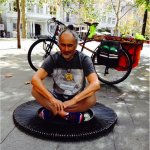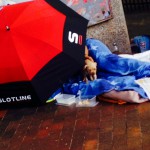Written in 1933, this book is a personal account by George Orwell of poverty and being in and out of work and homelessness in both Paris and London during the Great Depression. In London, beggars and tramps were institutionalised and socially ingrained in society. They were the very low of low in society and there was even distinction within the beggars and tramps with those who made money from selling matches or chalk drawing, being higher up than those who scoured the footpaths for cigarette butts to sell the tiniest bit of tobacco they might find in the butt.
Orwell’s account of men living in poverty in Paris seemed more hopeful. They were generally expected to get a job, pawn their clothes and belongings to pay their rent and there were some options. Being a dish pig or painter or bricklayer were options for men who had no money. It was more social with them living for the bistros. In England, tramps and beggars lived for tea and toast and seemed to move in a group finding a bed (or floor) in spikes to sleep. A spike is nightly boarding houses for up to 500 men in a dorm or converted prisons with two men sharing a 8x5x8 cell. They were given a cup of tea and bread on arrival and if lucky, in the morning were also given tea and toast. Undernourishment was rife among the population and most died from freezing to death or complications from undernourishment.
Living from meal to meal or bed to bed, this account is not dissimilar to how those who are homeless live today. The difference I see today is the introduction of illicit drugs and the choice to live on the support given by the government instead of a drive to be employed to make money or the age of entitlement. Rife from the 1900’s and with a boom in 1960s, drugs became a way to ease the pain of moving through living a life of poverty and homelessness. This bought many complications and are now inherent in the population today. Also introduced in the 1960s, was a government safety net to support the poverty stricken and provide a measly amount of money to live from if they could not find a job – today it is called New Start Allowance but becomes the main means of living for many of these people with little incentive to get a job.
I was speaking a young person yesterday in Kings Cross. I have noticed him around the streets looking pretty bad in the last couple of weeks. I asked him if he was ok yesterday and he wasn’t. He said he needed something to make his legs move, his lungs breathe, his eyes open and his head think, it was the only thing that could get him going. He said his girlfriend had given him some medication and he now needed it every day. Behind his hand he asked me if I had ever heard of Oxytocin. I asked him if it was the old batch or the new batch and as soon as he said it he was on the hunt for the $25 to be able to obtain it. The word Oxytocin was like a driving force to get it. He was going to get that $25 any way he could and I obviously was not the one to give it to him so he was on his way to find it or the money. This is a young person driven by addiction, is poverty-stricken and often sleeps rough or on someone’s couch.
Down and Out in Paris and London is written without judgement of the people Orwell encounters on his journey through poverty and recommended as an easy, thought provoking read.








Sorry, comments are closed for this post.